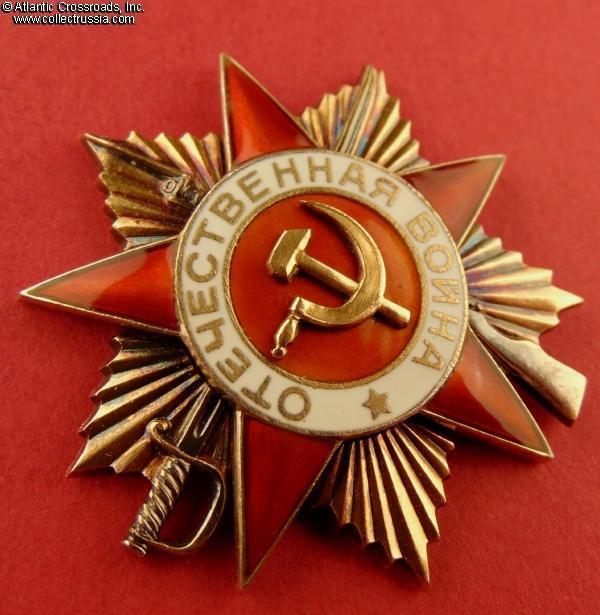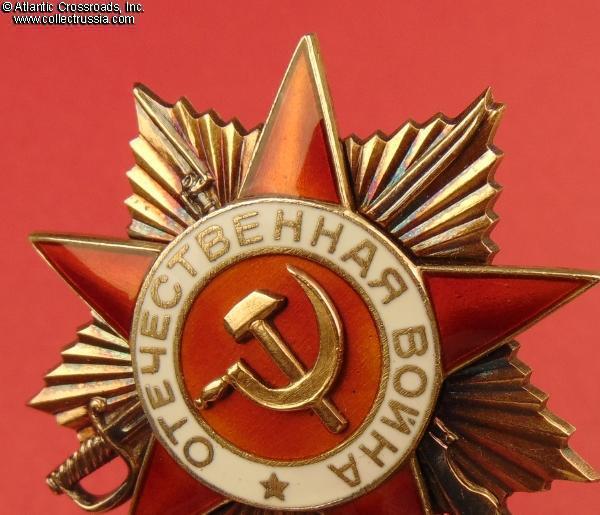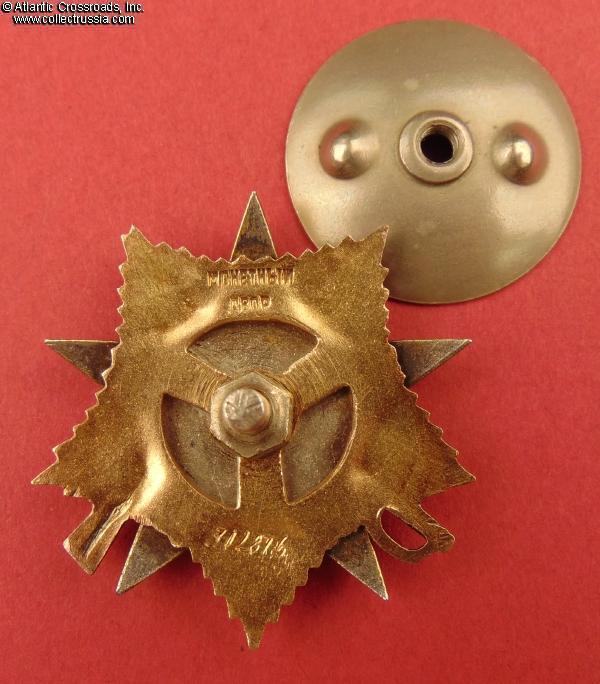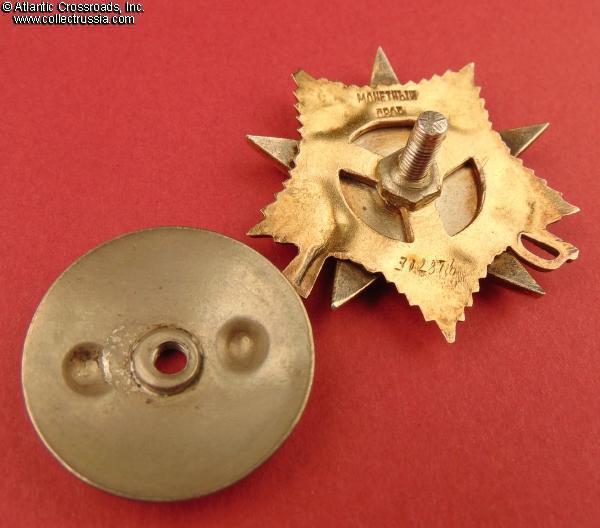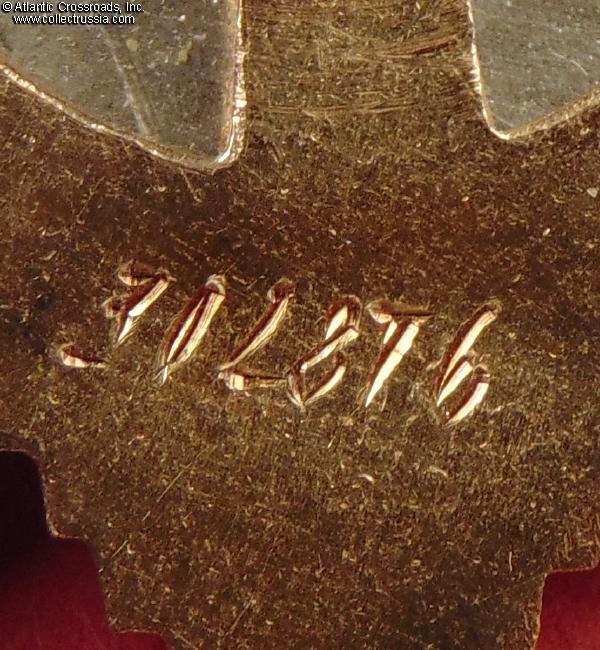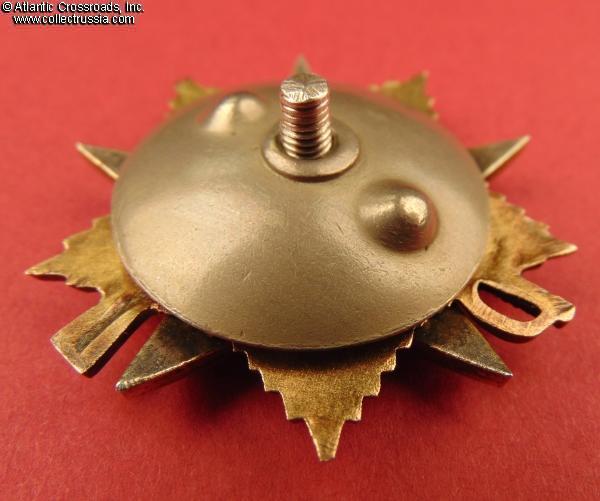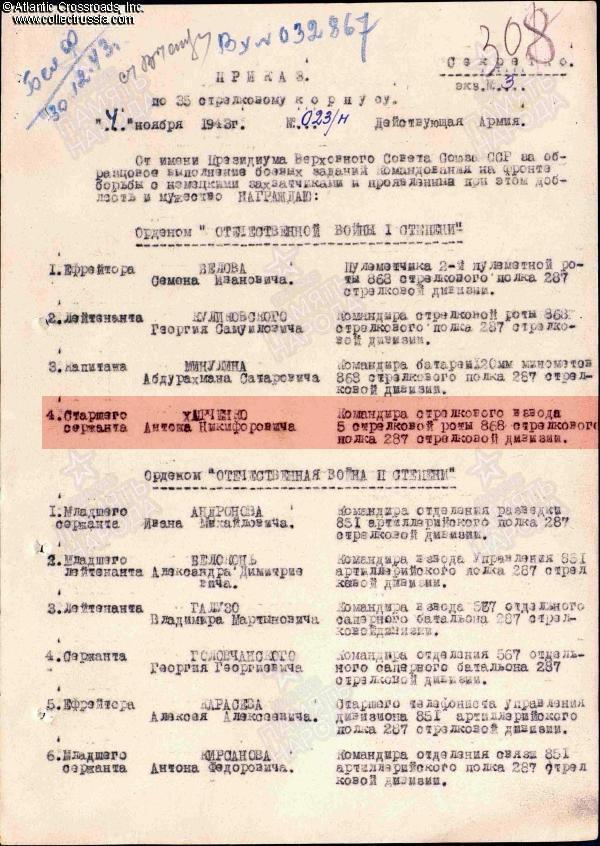Order of the Patriotic War 1st class, Type 2 Variation 2, #302876, awarded posthumously on 4 November 1943 to Senior Sergeant Anton Kharchenko, Rifle Platoon Commander, 868th Rifle Regiment, 287th Rifle Division, 35th Rifle Corps, 63rd Army, Belorussian Front.
In solid gold (14 K), sterling silver and enamels; measures 46.3 mm in height, 44.7 mm in width; weighs 31.2 g without the screw plate. This version features a two-line mint mark. The spokes on the reverse of the golden sunburst are at 2, 6 and 10 o'clock positions.
The order is in excellent, near mint condition. As would be expected of the award that was never worn, the enamel shows magnificent luster and is completely free of any wear that could be found even under a 10x magnification. The golden hammer & sickle emblem and starburst are likewise pristine. There is very attractive toning to the silver and gold parts. The screw post is full length, approx. 14 mm long measured from the reverse of the silver star. Comes with the original screw plate of early post-war type.
The award was delivered to the widow of the recipient in 1977, decades after the war. Situations like this were not particularly uncommon with surviving recipients: the paperwork was often lost or misplaced in the chaos of war, and many soldiers discovered that they had been decorated only years later. At that point, they could claim their rightful awards - what Russians usually referred to as nagrada nashla geroya i.e. "the award found the hero". It is however very unusual to see a posthumous decoration issued to a relative of the fallen hero on such a late date.
Anton Kharchenko was born in 1904 in a village of the Voronezh Region of Russia. In 1942, he joined the Red Army and starting from May 1943, was sent to a frontline unit. Just a short while thereafter, he greatly distinguished himself in the Battle of Kursk which was probably his first battle.
At the time, Kharchenko had the rank of Corporal serving with the 868th Rifle Regiment, 287th Rifle Division, 35th Rifle Corps, 63rd Army. Deployed just north of the German pincer driving towards Kursk from the north, the 63rd Army was one of the key elements of the Soviet Bryansk Front (army group) that on 12 July 1943 launched a spoiling attack into the German flank in the area of Oryol. On the very first day of the Soviet counteroffensive, Kharchenko showed true heroism. On his personal initiative, he led an entire company in a bold assault in Zalegoshchensky District of Oryol Region. He was the first to jump into a German trench where he wiped-out enemy machine gun nests with hand grenades and eliminated 9 German soldiers.
On the next day, Kharchenko with a group of soldiers covertly approached an enemy-occupied house in the village of Kazar, tossed hand grenades through the windows, and in a brief firefight killed 15 Germans - with Kharchenko himself dispatching two officers - and captured 18 prisoners. A day later, Kharchenko distinguished himself once again in the village of Arkhangelskoe of the same district where he took out the crew of a German light machine gun that had been thwarting the advance of Soviet infantry. On 27 July, he was the first to cross the Optukha River under enemy fire thus inspiring other soldiers. During the attack, Corp. Kharchenko replaced his fallen platoon commander boldly assuming effective command of the platoon; despite his low rank, this became his permanent position in the unit. When the Germans counterattacked in the area of the village of Gremyachiy, Oryol District, Kharchenko with a group of soldiers courageously defended his position killing 3 of the enemies on his own and with his group taking 80 POWs. Over the course of the battle, he was wounded twice, on 14 and 25 July, but never left the battlefield and kept on fighting.
On 5 September, soon after the victorious conclusion of the Battle of Kursk, Kharchenko was recommended for the Title of Hero of the Soviet Union by his regiment commander. Within less than two months, the recommendation was seemingly approved by the chain of command through the commander and chief political officer of the 63rd Army. Inexplicably however, the final decision on the army level was to award Kharchenko with an Order of the Red Banner which was officially bestowed upon him on 31 October 1943. Albeit a much lesser award than the Hero Star, it was still an uncommonly high decoration at the time, especially for a low-ranking infantryman. (We've seen a number of other cases of unexplained and very drastic downgrades of awards for the Battle of Kursk. During this period, Soviet high command was apparently very stingy with high-level decorations, although the requirements were significantly relaxed soon thereafter at around the time of the Battle of the Dnieper).
While his first award recommendation was still making its way through the chain of command, Kharchenko's regiment broke into eastern Belorussia and reached the village of Novoselki of the Vetkovskiy (Vetka) District northeast of Gomel. During the period of the regiment's offensive operations from 12-15 October 1943, Kharchenko, by then already promoted to Senior Sergeant, time and again showed exceptional heroism. His platoon withstood seven counterattacks of numerically superior German forces; while repelling just one of them, Kharchenko personally killed over 30 enemy soldiers with hand grenades. On three occasions, he led his entire company in an assault shouting "For dear Belorussia! For Stalin!" and was eventually killed by a German bullet.
On 23 October - a week before the Red Banner award decree - Kharchenko was posthumously recommended for an Order of the Patriotic War, 1st cl. by his regiment commander. On 4 November 1943, the award received final approval of the command of the 35th Rifle Corps and was officially bestowed by its decree. Unlike the prior Order of the Red Banner that according to the Soviet regulations was never physically issued to anyone because the intended recipient was no longer alive, the badge of the Order of the Patriotic War was supposed to be given to the next of kin. It however took another 34 years for the actual decoration to be issued to Kharchenko's widow Klavdiya Fyodorovna Kharchenko who resided in Moldavia at the time.
Research Materials: photocopy of the 1977 award record card stating that the Order of the Patriotic War 1st cl. #302876 was given to Kharchenko's widow "for safekeeping" and award commendations for the Title of Hero (resulting in the award of the Order of the Red Banner) and Order of the Patriotic War, 1st cl.
Item# 39597
$1,450.00 Add to cart


